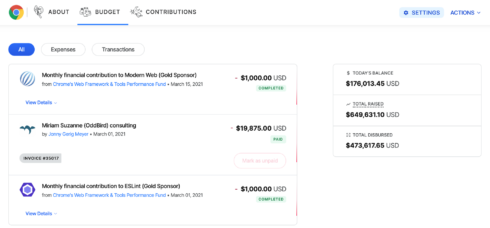
Open Collective is trying to make working full-time for an open-source project an alternative to a career developing for a for-profit company. It believes the steps to achieve this goal include eliminating friction between projects, the communities that support them, and the corporations that depend on them.
It is introducing Funds to its open funding management platform to make it easier for companies to invest in open-source projects by making a one-time payment to a Fund, which then redistributes the money to different projects and contributors, rather than paying those projects individually.
“Big companies call the process for paying for stuff ‘procurement.’ It’s often pretty involved, with contracts, invoices, purchasing order numbers, and bureaucracy—a painful thing to go through repeatedly for small amounts. It’s practically a blocker. It is so much simpler and more practical to ask corporations to make one large payment, to one vendor. Make it easy and companies will invest more,” Pia Mancini, co-founder of Open Collective wrote in a post.
For example, Chrome invests in 17 open-source projects through its Web Framework & Tools Performance Fund. Rather than having Google’s finance department make 17 contributions to different groups or individuals with separate procurement processes, it makes one payment that then get redistributed,
According to Open Collective, more and more companies are now becoming aware of the need to compensate developers for their work on open-source projects and are willing to fund them. There are a few reasons for this, such as developers taking pride in working at a company that supports open source, access to creators, building a positive reputation within the community, ensuring their own open-source dependencies are being properly maintained, and ensuring open-source projects can scale with their needs.
The main challenge with financially supporting these projects is that contracts and partnership agreements don’t happen in the open-source community the same way they do in the business world. Open-source projects are often made up of a distributed group of people, some tied to companies or foundations. This makes it difficult to invest in them, but Open Collective believes Funds will make it easier.






